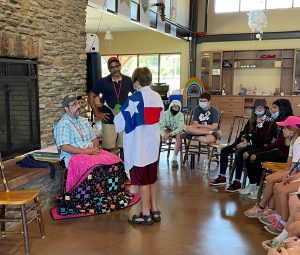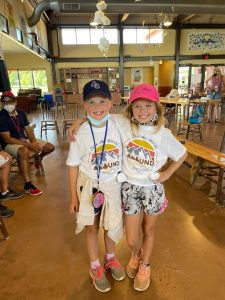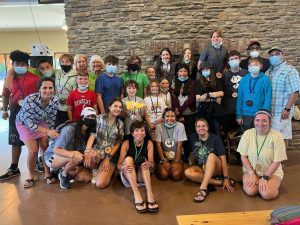One of our break-out sessions at Camp Hope consisted of a reverse role-play in which the doctors became the patient, and the patients became the doctor. The children were instructed to say what they wished their doctors would say to them in a hospital setting.
Pretending to be patients, our doctors wrapped in a quilt from a sitting position while the children stood over them with a clipboard donning a “lab coat” (we did not have a real lab coat, so we used our doctor’s over-sized button-up shirt with a GIGANTIC Texas flag on the back. Nothing like showing these Ohioans a little Texas pride…..).
I knew this would be a great exercise for the children, but I never dreamed the lessons I would learn from their interaction.
These hospital veteran patients between the ages of 8 and 15 asked freakishly precise medical questions while dispensing advice:
“What number are you on a pain scale and which medications work best for you? We don’t want to give you something that makes you worse.”
“Your lipase and amylase are high which means you have pancreatitis, so we need to get an MRCP of your abdomen. This means taking a picture of your tummy.”
“You need an IV for fluids and medications before we can get you a central line. But don’t worry, we will place the IV on the left-side of your arm so you can still do schoolwork with your right-hand.”
It was fascinating watching these children in their element. But what struck me was not the seasoned medical jargon coming from these young children’s mouths. OF COURSE, these children would know what medical questions to ask. Some have lived more days inside a hospital than out.
What struck me was the sincere desire for a personal, compassionate connection from doctor to patient.
Without fail, EVERY child started their exam with an empathetic statement:
“I am sorry you missed your soccer practice today.”
“It makes me sad you are back in the hospital and hurting so badly.”
“I know you don’t want to be sick, but I am here for you.”
They never started their conversation with medical questions.
They started by offering sympathy.
I am not sure how many of you have spent a considerable amount time in a hospital, but I can assure you, offering sympathy to patients with each (or any) interaction is a rarity. Even with the best of doctors. Life in a hospital consists of teams rounding in and out, focusing on the problems at hand. It is the doctor’s job to “fix” the patient.
Most specialists take their job very seriously while concentrating on the facts.
These children KNOW doctors are there to help them. Yet, having a doctor check on their physical constitution was secondary.
Checking on their feelings was their number one priority:
So many times, when a loved one is in crisis, we want to be the “doctor” to their problem. We swoop in to try and fix their pain, fix their ailment, and fix their heartbreak. But the core of what those suffering need most, is a mere acknowledgment of their hurt:
“I am so sorry you are going through this; please know I am here.”
Such a simple yet profound reminder that we are called to love one another first. Because love is the greatest of all…..
Thank you Lord for the unexpectedly miraculous lessons these children continually teach me.
Love to each of you,
Christyn




